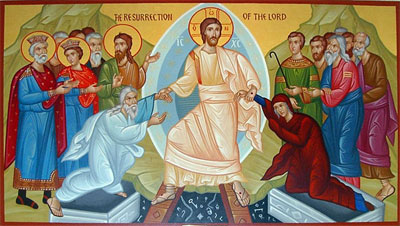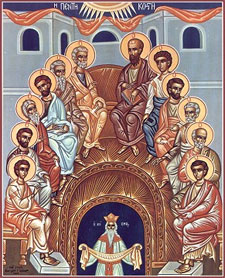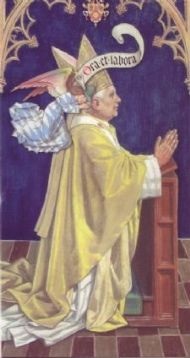Sunday, March 23, 2008
“I have risen and I am still with you, for ever.”
“I have risen and I am still with you, for ever.” These words invite us to contemplate the risen Christ, letting his voice resound in our heart. With his redeeming sacrifice, Jesus of Nazareth has made us adopted children of God, so that we too can now take our place in the mysterious dialogue between him and the Father. We are reminded of what he once said to those who were listening: “All things have been delivered to me by my Father; and no one knows the Father except the Son and any one to whom the Son chooses to reveal him” (Mt 11:27). In this perspective, we note that the words addressed by the risen Jesus to the Father on this day – “I am still with you, for ever” – apply indirectly to us as well, “children of God and fellow heirs with Christ, provided we suffer with him in order that we may also be glorified with him” (cf. Rom 8:17). Through the death and resurrection of Christ, we too rise to new life today, and uniting our voice with his, we proclaim that we wish to remain for ever with God, our infinitely good and merciful Father.
In this way we enter the depths of the Paschal mystery. The astonishing event of the resurrection of Jesus is essentially an event of love: the Father’s love in handing over his Son for the salvation of the world; the Son’s love in abandoning himself to the Father’s will for us all; the Spirit’s love in raising Jesus from the dead in his transfigured body. And there is more: the Father’s love which “newly embraces” the Son, enfolding him in glory; the Son’s love returning to the Father in the power of the Spirit, robed in our transfigured humanity. From today’s solemnity, in which we relive the absolute, once-and-for-all experience of Jesus’s resurrection, we receive an appeal to be converted to Love; we receive an invitation to live by rejecting hatred and selfishness, and to follow with docility in the footsteps of the Lamb that was slain for our salvation, to imitate the Redeemer who is “gentle and lowly in heart”, who is “rest for our souls” (cf. Mt 11:29).
 Dear Christian brothers and sisters in every part of the world, dear men and women whose spirit is sincerely open to the truth, let no heart be closed to the omnipotence of this redeeming love! Jesus Christ died and rose for all; he is our hope – true hope for every human being. Today, just as he did with his disciples in Galilee before returning to the Father, the risen Jesus now sends us everywhere as witnesses of his hope, and he reassures us: I am with you always, all days, until the end of the world (cf. Mt 28:20). Fixing the gaze of our spirit on the glorious wounds of his transfigured body, we can understand the meaning and value of suffering, we can tend the many wounds that continue to disfigure humanity in our own day. In his glorious wounds we recognize the indestructible signs of the infinite mercy of the God of whom the prophet says: it is he who heals the wounds of broken hearts, who defends the weak and proclaims the freedom of slaves, who consoles all the afflicted and bestows upon them the oil of gladness instead of a mourning robe, a song of praise instead of a sorrowful heart (cf. Is 61:1,2,3). If with humble trust we draw near to him, we encounter in his gaze the response to the deepest longings of our heart: to know God and to establish with him a living relationship in an authentic communion of love, which can fill our lives, our interpersonal and social relations with that same love. For this reason, humanity needs Christ: in him, our hope, “we have been saved” (cf. Rom 8:24).
-- From Pope Benedict XVI's Urbi et Orbi Message - Easter 2008Labels: feasts
Sunday, May 27, 2007
Feast of Pentecost - 2007
 . . . the Church had its solemn beginning with the descent of the Holy Spirit. In this extraordinary event we find the essential and qualifying marks of the Church: the Church is one, like the community of Pentecost, which was united in prayer and "of one mind": "it had but one heart and one soul" (Acts 4:32).
The Church is holy, not because of its own merits, but because, animated by the Holy Spirit, it keeps its gazed fixed upon Christ to become conformed to him and his love. The Church is catholic because the Gospel is destined for all people and for this reason, already at the beginning, the Holy Spirit gives the Church the ability to speak in different tongues. The Church is apostolic because, built upon the foundation of the apostles, it faithfully conserves their teaching through the uninterrupted chain of apostolic succession.
The Church, moreover, is missionary by its nature, and from the day of Pentecost the Holy Spirit does not cease to move it along the roads of the world to the ends of the earth and to the end of time. This reality, which we can verify in every epoch, is already anticipated in the Book of Acts, in which the passage of the Gospel from the Jews to the pagans, from Jerusalem to Rome, is described.
Rome represents the pagan world and therefore all peoples who are outside the ancient people of God. In fact, the Acts conclude with the arrival of the Gospel in Rome. We can say, then, that Rome is the concrete name of the catholicity and missionary spirit of the Church; it expresses fidelity to the origins, to the Church of all times, to a Church that speaks in all languages and goes out to meet every culture.
Dear brothers and sisters, the first Pentecost happened when Mary Most Holy was present among the disciples in the cenacle in Jerusalem and prayed. Today also we entrust ourselves to her maternal intercession so that the Holy Spirit descend abundantly upon the Church of our time and fill the hearts of all the faithful and enkindle in them -- in us -- the fire of his love. Pope Benedict XVI on the Solemnity of Pentecost. May 27, 2007. Labels: feasts
Sunday, January 28, 2007
Feast Day of St. Thomas Aquinas

- Pope reemphasizes relationship between faith and reason, cites example of St. Thomas Aquinas (Catholic News Agency):
Pope Benedict XVI used this week's Angelus to return to one of his favorite topics: the relation of Faith and Reason. Citing the example of St. Thomas Aquinas, whose feast day was Sunday, Benedict urged the faithful to remember that faith and reason are not exclusionary principles. . . .
- St. Thomas Aquinas, Priest, Doctor of the Church - introduction by Tom Kreitzberg.
- Reading Thomas Aquinas - Recommended Aids & Introductions Against The Grain January 13, 2006.
- Joseph M. Magee's Thomistic Philosophy (AquinasOnline.com)
- Aquinas in Context by Robert P. Imbelli (Commonweal January 28, 2007):
Too often, even among those tutored in theology, knowledge of the great doctor of the church, is limited to his masterful Summa Theologiae. And, even here, it is the first two parts that receive most attention. What can thereby escape notice is how radically Christocentric Thomas' vision and theology are. . . .
Labels: feasts
Tuesday, January 02, 2007
Pope Benedict on Christmas, the Holy Family and the Human Person
- On the Meaning of Christmas - translation of the address Benedict XVI gave at the general audience last Wednesday, held in Paul VI Hall:
Let us return to the question: "Why did God become man?" St. Irenaeus writes: "The word has become the dispenser of the Father's glory for the usefulness of men.... The glory of God is the living man -- 'vivens homo' -- and the life of man consists in the vision of God" ("Adv. Haer," IV, 20.5.7).
God's glory is manifested, therefore, in the salvation of man, whom God has so loved "who gave him," as John's Gospel affirms, "his only Son so that he who believes in him will not perish, but have eternal life" (John 3:16). So love is the ultimate reason for Christ's incarnation.
Eloquent in this respect is the reflection of the theologian Hans Urs von Balthasar, who wrote: God "is not, in the first place, absolute power, but absolute love whose sovereignty is not manifested in keeping for himself what belongs to him, but in its abandonment" ("Mysterium Paschale," 1,14).
- Pope Benedict on the Holy Family - translation of the address Benedict XVI delivered Sunday, the feast of the Holy Family, before reciting the midday Angelus:
. . . Let us now invoke together the protection of Mary Most Holy and of St. Joseph for every family, especially for those in difficulty. May they be supported so that they will be able to resist the disintegrating impulses of a certain contemporary culture which undermines the very basis of the family institution. May they may help Christian families throughout the world to be the living image of the love of God.
- Benedict on the Human Person - translation of the address Benedict XVI gave today before reciting the midday Angelus with tens of thousands of people gathered in St. Peter's Square:
At present there is much talk about human rights, but it is often forgotten that they need a stable -- not relative or debatable -- foundation. And this can only be the person's dignity. Respect for this dignity begins with the recognition and protection of the person's right to freely live and profess his religion.
We address our prayer with confidence to the Holy Mother of God, so that sacred respect for every human person and rejection of war and violence will be developed in consciences. Help us, Mary, you who gave Jesus to the world, to receive from him the gift of peace and to be sincere and courageous builders of peace.
|

Image from Benodette @ The Benedict Forum |
Labels: feasts
Sunday, August 06, 2006
Feast of the Transfiguration of Christ
 Jesus took with him Peter and James and John, and led them up a high mountain apart by themselves; and he was transfigured before them, and his garments became glistening, intensely white, as no fuller on earth could bleach them. And there appeared to them Elijah with Moses; and they were talking to Jesus. And Peter said to Jesus, "Master, it is well that we are here; let us make three booths, one for you and one for Moses and one for Elijah." For he did not know what to say, for they were exceedingly afraid. And a cloud overshadowed them, and a voice came out of the cloud. "This is my beloved Son; listen to him." And suddenly looking around they no longer saw any one with them but Jesus only.And as they were coming down the mountain, he charged them to tell no one what they had seen, until the Son of man should have risen from the dead. So they kept the matter to themselves, questioning what the rising from the dead meant. [Mark 9: 2-10]
Labels: feasts
Sunday, June 04, 2006
Feast of Pentecost - 2006
 The People of God, who found their first configuration on Sinai, have now been enlarged to the extent that they are no longer bound by any borders of race or culture, of space or time. As opposed to what happened with the tower of Babel (cfr Gen. 11:1-9), when men who wanted to build a path to heaven with their own hands, ended up by destroying their own capacity for mutual understanding, in Pentecost, the Spirit, with the gift of tongues, reveals how his presence unites and transforms confusion into communion. The pride and egotism of man always create division and build walls of indifference, of hate and of violence. The Holy Spirit, on the contrary, makes hearts capable of understanding the languages of all, because it re-establishes the bridge of authentic communion between Earth and Heaven. The Holy Spirit is love.
But how to enter into the mystery of the Holy Spirit, how to understand the secret of Love? The pages of today’s Gospel take us today to the Cenacle where, once the last Supper was over, a sense of confusion saddened the Apostles. The reason was that the words of Jesus had raised worrying questions: He talked about hatred of the world for him and his followers, he talked about his mysterious departure and there were many other things yet to be said, but for the time being, the Apostles were not capable of carrying the burden (cfr Jn:16:32). To tackle them, he explains the meaning of his distance: he will leave, but he will return; in the meantime, he will not abandon them, he will not leave them orphans. He will send the Consoler, the Spirit of the Father, and it will be the Spirit who will lead them to understand that the work of Christ is a labour of love: the love of He who has sacrificed himself, the love of the Father who gave him up.
This is the mystery of Pentecost: the Holy Spirit enlightens the human spirit, and, revealing the crucified and resurrected Christ, shows the way to becoming more like Him, that is, to being ‘an expression and instrument of the love that emanates from him’ (Deus Caritas Est, 33). Gathered together with Mary, as it was at the time of its birth, the Church today prays: ‘Veni Sancte Spiritus! – Come Holy Spirit, fill the hearts of your faithful and kindle in them the fire of your love!’ Amen.
Pope Benedict XVI - Homily on the Feast of Pentecost (2006). (Link via Amy Welborn).
More Pentecost Reflections:
Labels: feasts
|
From the new blog

|


















